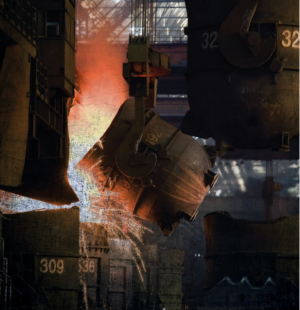Refractory materials play a crucial role in the steel and cement industry. These materials are designed to withstand high temperatures, chemical erosion, and physical wear and tear that are usually associated with the production of steel and cement. Refractory materials are used to line the walls, floors, and roofs of furnaces, kilns, and reactors, ensuring that they operate efficiently and effectively. There are various types of refractory materials that are used in the steel and cement industry, including bricks, castables, and mortars.

One of the primary reasons why refractory materials are so important in the steel and cement industry is because of their ability to withstand high temperatures. Steel production, for instance, requires extremely high temperatures to melt the steel scrap and other raw materials. Refractory materials are used to line the furnaces and other equipment that are used in this process, ensuring that they can withstand the extreme heat. Similarly, the production of cement involves high-temperature reactions, which require the use of refractory materials to protect the kilns and reactors from damage.
Refractory materials also play a vital role in protecting the equipment used in steel and cement production from chemical erosion. The chemical reactions that take place during the production of steel and cement can cause damage to the equipment over time, and refractory materials provide a protective barrier that can withstand these reactions. This protection is particularly important in the cement industry, where the raw materials used in cement production can be extremely corrosive.
Another essential aspect of refractory materials in the steel and cement industry is their ability to resist physical wear and tear. The production of steel and cement requires heavy machinery that can cause a lot of wear and tear on the equipment. Refractory materials are designed to resist the impact of these heavy machines and prolong the life of the equipment. This is particularly important in the cement industry, where the raw materials used in cement production can be extremely abrasive.
The use of high-quality refractory materials can significantly improve the efficiency of steel and cement production. For example, the use of lightweight refractory materials can reduce the weight of the lining of a furnace, allowing for faster heating and cooling times. Similarly, the use of low-thermal-conductivity refractory materials can reduce heat loss, resulting in energy savings and cost savings for the steel and cement industry.
Moreover, the choice of the right refractory materials can also have a significant impact on the safety and environmental impact of the steel and cement industry. The use of low-toxicity refractory materials can improve the safety of workers, while the use of environmentally friendly refractory materials can reduce the environmental impact of steel and cement production.
In recent years, there has been a growing demand for high-quality refractory materials from the steel and cement industry. This demand has been driven by increasing global competition, stricter environmental regulations, and a focus on improving the efficiency and safety of steel and cement production. In response to this demand, many companies have started offering a wide range of high-quality, cost-effective refractory materials to the steel and cement industry.
Trasteel International SA offers a full range of refractory materials for the steel and cement industry. Founded in 1999 as Changyao refractory material company, Trasteel has specialized in producing high-quality refractory materials such as refractory bricks, aluminum silicate stopper cones, aluminum silicate wool boards, and others that are used in aluminum or other metal melting and casting plants. The company's refractory materials are known for their durability, high-temperature resistance, and ability to withstand chemical and physical erosion.
In conclusion, refractory materials are essential in the steel and cement industry. They play a critical role in protecting the equipment used in steel and cement production from high temperatures, chemical erosion, and physical wear and tear. The use of high-quality refractory materials can significantly improve the efficiency, safety, and environmental impact of steel and cement production. Hence, it is crucial for companies to choose and use the right refractory materials to operate efficiently and effectively in the manufacturing process.